#davi things
Explore tagged Tumblr posts
Text
If you don't use the bathroom to just sit on your phone as a customer service worker just to avoid people, are you even doing your job right?
23 notes
·
View notes
Text
I don't know
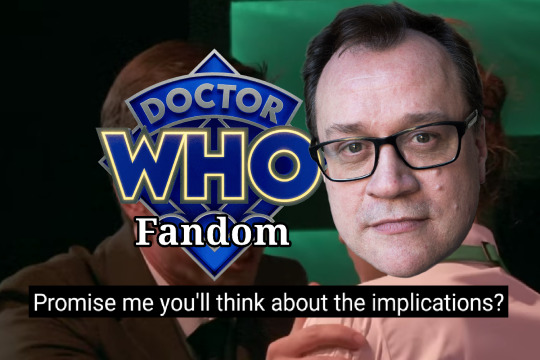

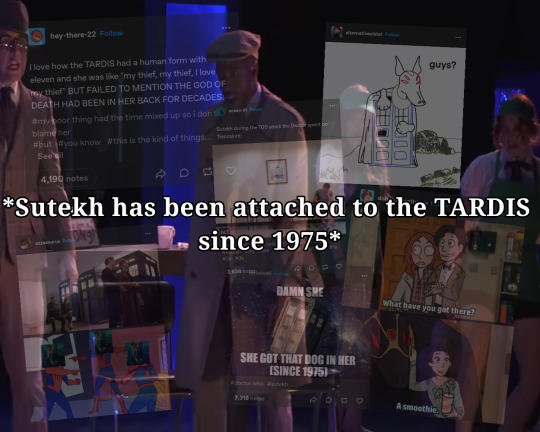
#does this make sense#i was very sleep deprived when i came up with this#doctor who#sutekh#dw#dw spoilers#doctor who spoilers#nuwho#new who#15th doctor#dw memes#rtd didnt think about the implications smh#russell t davies#rtd2 era#the guy who didn't like musicals#(technically)#okay wow this blew up#i feel the need to clarify for the people in the notes: this post does not reflect my personal opinions on sutekh or RTD#i wasnt such a fan of the last two parter but thats just a me thing#the dw timeline is so fucked up already and i love it
4K notes
·
View notes
Text

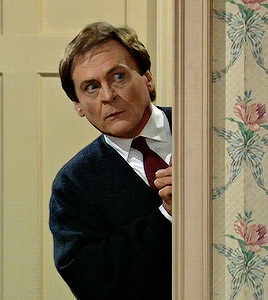
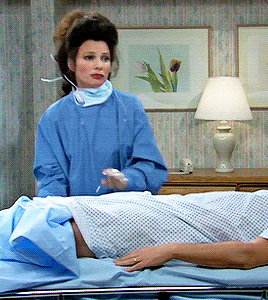
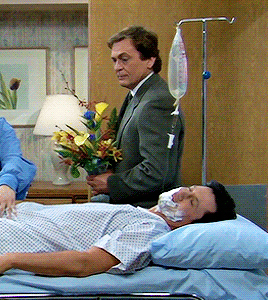



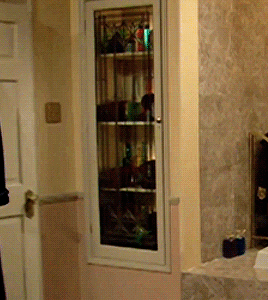


#Impeccable Timing
+Bonus


#my favorite thing of the series niles walking in on them#legends only#the nanny#fran x maxwell#maxwell x fran#fran fine#maxwell sheffield#fran drescher#charles shaughnessy#cc x niles#niles x cc#love#lauren lane#daniel davis
2K notes
·
View notes
Text

Okay future boy. They should hang out.
(Jefferson completely absorbing everything his Spider-man says is peak. Miles, all your dad wants is to listen to you. Water you doin'?)
#Honestly I hope the Morales family never finds out about the canon event thing or the chase because imo that's the funniest outcome by far#Rio and Jeff be like “Another Latino Spider-man! :)” meanwhile Miguel is taking guilt damage from Earth-1610 like it's a poison swamp level#The Davis-Morales Special of trying to play it cool while being awkward as hell#my art#jefferson morales#miguel o'hara#miguel ohara#atsv fanart#atsv miguel#spider man 2099#across the spiderverse#speculative btsv?#spider man#atsv#jefferson davis#spiderman 2099#In this scenario the Spot ended up thrashing Spider-Society so badly they couldn’t do anything to enforce Jeff’s canon event#So Jeff is alive telling everyone “It’s great that Spider-man brought all his friends to help fight that Holes guy.”#spiderman across the spiderverse#spiderverse fanart#across the spider verse
1K notes
·
View notes
Text
Greg “I don’t want to fuck him” Davies, everyone
#we love character development#losing my goddamn mind#just saying things#primal and raw screeeeeching#greg davies#alex horne#taskhusbands#taskmaster uk#taskmaster#my edits
619 notes
·
View notes
Text
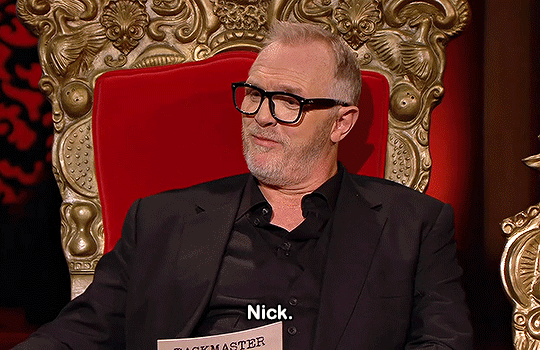
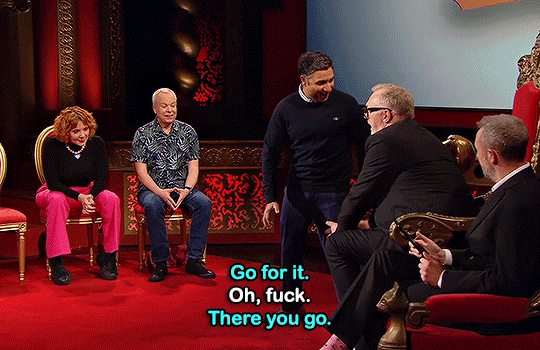
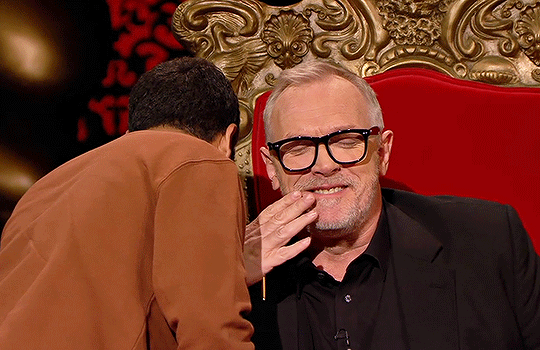


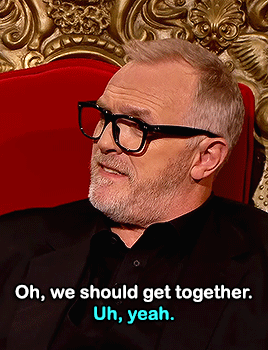
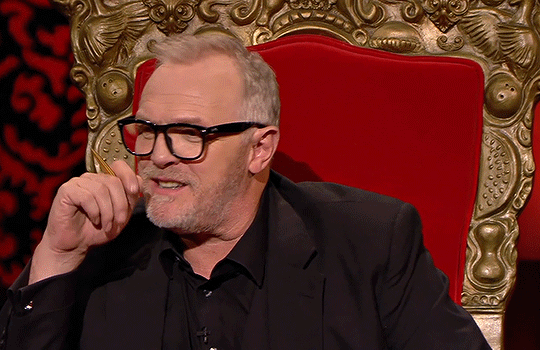
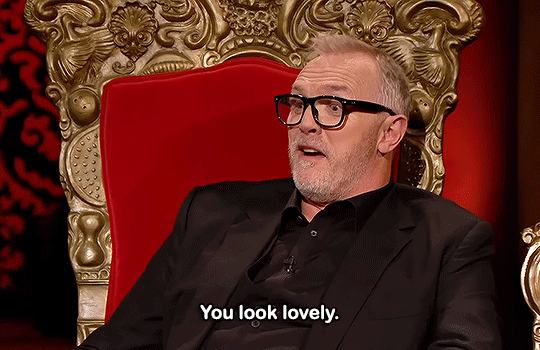

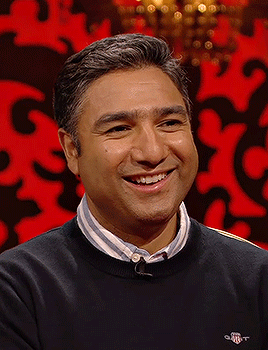
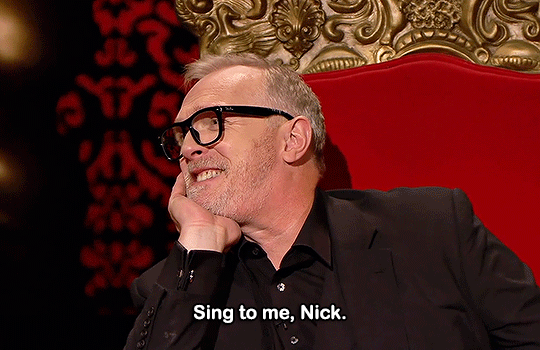
Greg and Nick in Taskmaster Series 17
#taskmaster#s17#greg davies#nick mohammed#this relationship was one of my fave things about this series#m
1K notes
·
View notes
Text
'...“It’s fun playing bad, but actually he’s not,” the actor says, smiling as he reflects on his character, Crowley. “He’s a villain with a heart. The amount of really evil things he does are vanishingly small.”
...As it always has, “Good Omens” dissects the view of good and evil as absolutes, showing viewers that they are not as separate as we were led to believe growing up. Aziraphale and Crowley’s long-standing union is proof of this. The show also urges people to look at what defines our own humanity. For Tennant — who opted to wear a T-shirt emblazoned with the words “Leave trans kids alone you absolute freaks” during a photocall for Season 2 — these themes are more important now than ever before.
“In this society that we’re currently living in, where polarization seems ever more present, fierce and difficult to navigate. Negotiation feels like a dirty word at times,” he says, earnestly. “This is a show about negotiation. Two extremes finding common ground and making their world a better place through it. Making life easier, kinder and better. If that’s the sort of super objective of the show, then I can’t think of anything more timely, relevant or apt for the rather fractious times we’re living in.”
“Good Omens” is back by popular demand for another season. How does it feel?
It’s lovely. Whenever you send something out into the world, you never quite know how it will land. Especially with this, because it was this beloved book that existed, and that creates an extra tension that you might break some dreams. But it really exploded. I guess we were helped by the fact that we had Neil Gaiman with us, so you couldn’t really quibble too much with the decisions that were being made. The reception was, and continues to be, overwhelming.
Now that you’re no longer bound by the original material that people did, perhaps, feel a sense of ownership over, does the new content for Season 2 come with a sense of freedom for you? This is uncharted territory, of sorts.
That’s an interesting point. I didn’t know the book when I got the script. It was only after that I discovered the worlds of passion that this book had incited. Because I came to it that way, perhaps it was easier. I found liberation from that, to an extent. For me, it was always a character that existed in a script. At first, I didn’t have that extra baggage of expectation, but I acquired it in the run-up to Season 1 being released�� the sense that suddenly we were carrying a ming vase across a minefield.
In Season 2, we still have Neil and we also have some of the ideas that he and Terry had discussed. During the filming of the first one, Neil would drop little hints about the notions they had for a prospective sequel, the title of which would have been “668: The Neighbour of the Beast,” which is a pretty solid gag to base a book around. Indeed there were elements like Gabriel and the Angels, who don’t feature in the book, that were going to feature in a sequel. They were brought forward into Season 1. So, even in the new episodes, we’re not entirely leaving behind the Terry Pratchett-ness of it all.
It’s great to see yourself and Michael Sheen reunited on screen as these characters. Fans will have also watched you pair up for Season 3 of “Staged.” You’re quite the dynamic duo. What do you think is the magic ingredient that makes the two of you such a good match?
It’s a slightly alchemical thing. We knew each other in passing before, but not well. We were in a film together [“Bright Young Things,” 1993] but we’d never shared a scene. It was a bit of a roll of the dice when we turned up at the read-through for “Good Omens.” I think a lot comes from the writing, as we were both given some pretty juicy material to work with. Those characters are beloved for a reason because there’s something magical about them and the way they complete each other. Also, I think we’re quite similar actors in the way we like to work and how we bounce off each other.
Does the shorthand and trust the two of you have built up now enable you to take more risks on-screen?
Yes, probably. I suppose the more you know someone, the more you trust someone. You don’t have to worry about how an idea might be received and you can help each other out with a more honest opinion than might be the case if you were, you know, dancing around each other’s nervous egos. Enjoying being in someone’s orbit and company is a positive experience. It makes going to work feel pleasant, productive, and creative. The more creative you can be, the better the work is. I don’t think it’s necessarily a given that an off-screen relationship will feed into an on-screen one in a positive or negative way. You can play some very intimate moments with someone you barely know. Acting is a peculiar little contract, in that respect. But it’s disproportionately pleasurable going to work when it’s with a mate.
Fans have long discussed the nature of Crowley and Aziraphale’s relationship. In Season 2, we see several of the characters debate whether the two are an item, prompting them to look at their union and decipher what it is. How would you describe their relationship?
They are utterly co-dependent. There’s no one else having the experience that they are having and they’ve only got each other to empathize with. It’s a very specific set of circumstances they’ve been dealt. In this season, we see them way back at the creation of everything. They’ve known each other a long time and they’ve had to rely on each other more and more. They can’t really exist one without the other and are bound together through eternity. Crowley and Aziraphale definitely come at the relationship with different perspectives, in terms of what they’re willing to admit to the relationship being. I don’t think we can entirely interpret it in human terms, I think that’s fair to say.
Yet fans are trying to do just that. Do you view it as beyond romantic or any other labels, in the sense that it’s an eternal force?
It’s lovely [that fans discuss it] but you think, be careful what you wish for. If you’re willing for a relationship to go in a certain way or for characters to end up in some sort of utopian future, then the story is over. Remember what happened to “Moonlighting,” that’s all I’m saying! [Laughs]
Your father-in-law, Peter Davison, and your son, Ty Tennant, play biblical father-and-son duo Job and Ennon in Episode 2. In a Tumblr Q&A, Neil Gaiman said that he didn’t know who Ty’s family was when he cast him. When did you become aware that Ty had auditioned?
I don’t know how that happened. I do a bunch of self-tapes with Ty, but I don’t think I did this one with him because I was out of town filming “Good Omens.” He certainly wasn’t cast before we started shooting. There were two moments during filming where Neil bowled up to me and said, “Guess, who we’ve cast?” Ty definitely auditioned and, as I understand it, they would tell me, he was the best. I certainly imagine he could only possibly have been the best person for the job. He is really good in it, so I don’t doubt that’s true. And then my father-in-law showed up, as well, which was another delicious treat. In the same episode and the same family! It was pretty weird. I have worked with both of them on other projects, but never altogether.
There’s a “Doctor Who” cameo, of sorts, in Episode 5, when Aziraphale uses a rare annual about the series as a bartering tool. In reality, you’ll be reprising your Time Lord role on screen later this year in three special episodes to mark the 60th anniversary. Did you always feel you’d return to “Doctor Who” at some point?
There’s a precedent for people who have been in the series to return for a multi-doctor show, which is lovely. I did it myself for the 50th anniversary in 2013, and I had a wonderful time with Matt [Smith]. Then, to have John Hurt with us, as well, was a little treat. But I certainly would never have imagined that I’d be back in “Doctor Who” full-time, as it were, and sort of back doing the same job I did all those years ago. It was like being given this delightful, surprise present. Russell T Davies was back as showrunner, Catherine Tate [former on-screen companion] was back, and it was sort of like the last decade and a half hadn’t happened.
Going forward, Ncuti Gatwa will be taking over as the new Doctor. Have you given him any advice while passing the baton?
Oh God, what a force of nature. I’ve caught a little bit of him at work and it’s pretty exciting. I mean, what advice would you give someone? You can see Ncuti has so much talent and energy. He’s so inspired and charismatic. The thing about something like this is: it’s the peripherals, it’s not the job. It’s the other stuff that comes with it, that I didn’t see coming. It’s a show that has so much focus and enthusiasm on it. It’s not like Ncuti hasn’t been in a massive Netflix series [“Sex Education,”] but “Doctor Who” is on a slightly different level. It’s cross-generational, international, and has so much history, that it feels like it belongs to everyone.
To be at the center of the show is wonderful and humbling, but also a bit overwhelming and terrifying. It doesn’t come without some difficulties, such as the immediate loss of anonymity. It takes a bit of getting used to if that’s not been your life up to that point. I was very lucky that when I joined, Billie Piper [who portrayed on-screen companion, Rose] was still there. She’d lived in a glare of publicity since she was 14, so she was a great guide for how to live life under that kind of scrutiny. I owe a degree of sanity to Billie.
Your characters are revered by a few different fandoms. Sci-fi fandoms are especially passionate and loyal. What is it like being on the end of that? I imagine it’s a lot to hold.
Yes, certainly. Having been a fan of “Doctor Who” since I was a tiny kid, you’re aware of how much it means because you’re aware of how much it meant to you. My now father-in-law [who portrayed Doctor Who in the 80s] is someone I used to draw in comic strips when I was a kid. That’s quite peculiar! It’s a difficult balance because on one end, you have to protect your own space, and there aren’t really any lessons in that. That does take a bit of trial and error, to an extent, and it’s something that you’re sometimes having to do quite publicly. But, it is an honor and a privilege, without a doubt. As you’ve said, it means so much to people and you want to be worthy of that. You have to acknowledge that and be careful with it. Some days that’s tough, if you’re not in the mood.
I know you’re returning to the stage later this year to portray Macbeth. You’ve previously voiced the role for BBC Sounds, but how are you feeling about taking on the character in the theater?
I’m really excited about it. It’s been a while since I’ve done Shakespeare. It’s very thrilling but equally — and this analogy probably doesn’t stretch — it’s like when someone prepares for an Olympic event. It does feel like a bit of a mountain and, yeah, you’re daring to set yourself up against some fairly worthy competition from down the years. That’s both the challenge and the horror of doing these types of things. We’ve got a great director, Max Webster, who recently did “Life of Pi.” He’s full of big ideas. It’s going to be exciting, thrilling, and a little bit scary. I’m just going to take a deep breath.
Before we part ways, let’s discuss the future of “Good Omens.” Gaiman has said that he already has ideas for Season 3, should it happen. If you were to do another season, is there anyone in particular you’d love to work with next time around or anything specific you’d like to see happen for Crowley?
Oh, Neil Gaiman knows exactly where he wants to take it. If you’re working with people like Gaiman, I wouldn’t try to tamper with that creative void. Were he to ask my opinion, that would be a different thing, but I can’t imagine he would. He’s known these characters longer than me and what’s interesting is what he does with them. That’s the bit that I’m desperate to know. I do know where Crowley might end up next, but it would be very wrong if I told you.
[At this point, Tennant picks up a pencil and starts writing on a hotel pad of paper.]
I thought you were going to write it down for me then. Perhaps like a clandestine meeting on a bench in St James’ Park, but instead you’d write the information down and slide it across the table…
I should have done! I was drawing a line, which obviously, psychologically, I was thinking, “Say no more. You’re too tempted to reveal a secret!” It was my subconscious going “Shut the fuck up!”
#David Tennant#Michael Sheen#Good Omens#Neil Gaiman#Terry Pratchett#Ty Tennant#Peter Davison#Aziraphale#Crowley#Doctor Who#Macbeth#Ncuti Gatwa#Job#Ennon#Bright Young Things#Series 2#Matt Smith#John Hurt#Russell T. Davies#Catherine Tate#Max Webster#Life of Pi#Sex Education#Billie Piper#Rose Tyler#BBC Sounds
3K notes
·
View notes
Text




The coven before they were the coven.
#agatha all along#agatha all along spoilers#alice wu gulliver#lilia calderu#jen kale#mrs heart#sharon davis#owly gifs things
940 notes
·
View notes
Text
I feel like I've had the same experience several times now: someone does a new translation of a non-English literary classic, and all the critics praise it to the moon, so I go and try to read it, and it's turns out it's just . . . bad? Like, really bad? And weirdly bad?
A while back, I wrote about the case of Pevear and Volokhonsky. Here's another example, which I encountered while doing background research for my novel Almost Nowhere.
----
One of my novel's major characters is a literary translator, famous for his rendition of the Persian epic poem Shahnameh ("Book of Kings").
To help me write this character, I tried to read the Shahnameh myself. I started out – where else? – with the translation that seemed to be the gold standard, and which was certainly the most critically lauded.
Namely, the 2006 translation by Dick Davis, in prose with occasional shifts into verse.
Here's how the Shahnameh begins, in Davis' translation:
What does the Persian poet say about the first man to seek the crown of world sovereignty? No one has any knowledge of those first days, unless he has heard tales passed down from father to son. This is what those tales tell: The first man to be king, and to establish the ceremonies associated with the crown and throne, was Kayumars. When he became lord of the world, he lived first in the mountains, where he established his throne, and he and his people dressed in leopard skins. It was he who first taught men about the preparation of food and clothing, which were new in the world at that time. Seated on his throne, as splendid as the sun, he reigned for thirty years. He was like a tall cypress tree topped by the full moon, and the royal farr shone from him. All the animals of the world, wild and tame alike, reverently paid homage to him, bowing down before his throne, and their obedience increased his glory and good fortune.
And here is the same opening, in the 1905 translation by Arthur and Edmond Warner (which I only discovered much later in the process of writing Almost Nowhere):
What saith the rustic bard? Who first designed To gain the crown of power among mankind? Who placed the diadem upon his brow? The record of those days hath perished now Unless one, having borne in memory Tales told by sire to son, declare to thee Who was the first to use the royal style And stood the head of all the mighty file. He who compiled the ancient legendary, And tales of paladins, saith Gaiúmart Invented crown and throne, and was a Sháh. This order, Grace, and lustre came to earth When Sol was dominant in Aries And shone so brightly that the world grew young. Its lord was Gaiúmart, who dwelt at first Upon a mountain; thence his throne and fortune Rose. He and all his troop wore leopard-skins, And under him the arts of life began, For food and dress were in their infancy. He reigned o'er all the earth for thirty years, In goodness like a sun upon the throne, And as a full moon o'er a lofty cypress So shone he from the seat of king of kings. The cattle and the divers beasts of prey Grew tame before him; men stood not erect Before his throne but bent, as though in prayer, Awed by the splendour of his high estate, And thence received their Faith.
Now, I can't speak at all about the source text. I have no idea how faithful or unfaithful these two translations are, and in what ways, in which places.
Still, though. I mean like, come on.
This is an epic poem about ancient kings and larger-than-life heroes.
This is a national epic, half myth and half history, narrating the proud folkloric lineage claimed by a real-world empire.
There is a way that such things are supposed to sound, in English. And it sure as hell isn't this:
What does the Persian poet say about the first man to seek the crown of world sovereignty?
Excuse me? That's your opening line? I thought I was reading a poem, here, not taking a fucking AP World Literature exam!
----
Postscript
Some of the critical praise for the Davis translation, quoted on the back cover of my copy (emphasis mine):
"A poet himself, Davis brings to his translation a nuanced awareness of Ferdowsi's subtle rhythms and cadences. His "Shahnameh" is rendered in an exquisite blend of poetry and prose, with none of the antiquated flourishes that so often mar translations of epic poetry." (Reza Aslan, The New York Times Book Review) "Thanks to Davis's magnificent translation, Ferdowsi and the Shahnameh live again in English.” (Michael Dirda, Washington Post) "A magnificent accomplishment . . . [Davis’s translation] is not only the fullest representation of Ferdowsi’s masterpiece in English but the best." (The New York Sun)
#almost nowhere#fyi: the warner and warner translation is out of print now but archive.org has the whole 9-volume thing#hmm i wonder which version of the cypress/moon image is more faithful...#(in davis he's the tree. in warner&warner he's the moon. these are not the same metaphor!)
478 notes
·
View notes
Text

#things i do when i’m sick at home and bored#I honestly didn’t know where to put beckett#potc#pirates of the caribbean#alignment chart#potc alignment chart#jack sparrow#will turner#elizabeth swann#tia dalma#davy jones#james norrington#cutler beckett#hector barbossa#ian mercer
562 notes
·
View notes
Text
Life would be so much easier if we just spoke in song like every single teenager in high school musical.
7 notes
·
View notes
Text
uncle aaron in spiderverse fucks me up so badly because here is a man who has done terrible, unforgivable things, and he loves his nephew very much
#augh... augh#like he's selfish and he chooses the wrong path in order to stay afloat but this#n his love for miles r not mutually exclusive#the whole thing about how he wanted miles 2 look up to him what if I explode#srry no other iteration of him holds a candle esp the comics when it comes 2 his death#I am an itsv Aaron Davis apologist man#and the lack of content surrounding Aaron n miles makes me so sad ToT#itsv#atsv
3K notes
·
View notes
Text
Another note on Wild Blue Yonder
Can we take a moment to appreciate how
“Oh that’s right…we get hungry”
Is the most
TERRIFYING
LINE
EVER.
#like wtf#chills#absolute chills#RTD has still got it#doctor who#doctor who 60th anniversary#dw#dw 60th#russell t davies#rtd#rtd2#if that’s just a taste of things to come MY GOD!#we are in for a treat
1K notes
·
View notes
Text
how genderbending the warriors (2024) is done not for the sole sake of "bad-assery"
okay here we go feminist ramble time for our newest chick on the block: warriors. now i'll be honest, prior to listening to the album, when i first heard that the warriors main girls were originally dudes in the movie and the novel, i thought that the decision for the genderbending, in lmm's perspective, were from the following: 1.) girl power move in like a very basic meaning of the word "bad-ass" 2.) simply a twist on a cult movie about big gang bros loved by the film bros, and 3.) a way to have the schuyler sisters back together gjfkdfldf
but when i read more about warriors and its development and how lmm took inspiration from the gamergate controversies of 2014-2015 aka among the peak of gamerbro misogyny campaigns, that's when i realized that Oh Shit Is Serious - because adapting a story about a group being framed and targeted and harassed for something they are accused of doing without any substantial proof other than a man screaming "THE WARRIORS SHOT CYYYYRUUS" with 21st century misogyny campaigns in mind makes the theme of fighting back a lot more complicated and a lot more resonant, going beyond just marketing a cast you can call "badass"
take the hurricanes' quiet girls, for example. the hurricanes (concept album version) is the only gang that lets the warriors off the hook and with a stern warning: quiet girls don't make it home. here, the hurricanes berate the warriors for not saying shit or attempting to defend themselves from accusations they know well aren't true. THIS MESSAGE IN PARTICULAR is what stays and influences ajax, fox, and swan til the very end of their stories.
literally one song after this does ajax show how easily she resonated with the hurricanes' lesson by finally sticking with her gut and actually choosing to fight back against both the baseball furies AND against the sleazy undercover cop. the latter encounter is one of the instances that really solidifies the recontextualization of the story because in the OG movie, ajax (a dude) WAS the sleazy fuck up harassing a woman in a park - and now with the literal character switch, ajax goes from being just a rebellious gangbro dude bro into someone whose want to fight is warranted. such a want to fight is seen in fox seeing as fox is the first to comment on the quiet girls scene and that, in the concept album, she is the one that instigates the rumble against the police in union square - saying that she is sick of being afraid of them and their 'fuckin powder blue' colors (also notice how she is the only warrior that really does say fuck the cops i think that's cool BUT I'LL TALK ABOUT FOX MORE NEXT TIME)
to a less obvious extent, swan also gets the receiving end of this recurring theme - by the album's finale, the usually violence-averse caution-first interim leader becomes a lot fiercer in protecting her crew. but perhaps among what i consider to be the biggest recontextualized change in the feminist sense is MERCY and her motivations to join the warriors in the first place. according to the wiki, her attraction to swan and the warriors and um seeing the orphans as wimps is what led her to switch sides BUT IN THE CONCEPT ALBUM, mercy's motivation to become a warrior is deepened, rooted in admiration rather than attraction - wanting to be like those women who hold their head up high. and again, we see this in Sick of Runnin' when she takes part in the rumble, finding her bravery within their ranks as they fight back. here, mercy becomes less of a swan tagalong and more of someone that wants what the warriors have: pride.
of course now that i type this out i realize that warriors is not based solely on the feminist rhetoric as with their theme of hope amidst adversity, the story is more intersectional and rooted in community struggle and wanting for more than that. but nonetheless, i genuinely believe that the twt filmbros arguments on why the genders should not have been changed in the first place just for "woke" points is kinda like,,,very shortsighted because not only does the narrative of women narrowly escaping unwarranted accusations actually fucking fit, but the act of learning to fight back amidst all odds - be it that of disbelieving, predatory men or the power of oppressive pigs - stays resonant for women yesterday, today, and the days to come.
ultimately, warriors (2024) is not solely a tale of female badassery - rather, it is a tale of the need for such "female badassery" in the face of past and present realities, which is why it somehow fucking worked.
#believe me i admire lin greatly but i did not think this would work as well as it did#i genuinely thought upon the reveal of the all girl cast that this was gonna be um woo girl power moment and just that#i was not expecting the recontextualization of the plot#eSpECIALLY WITH AJAX AND MERCY HOLY SHIT#i guess less so for swan and fox tho because swan is um character development throughout the show thing#while fox! fox is um look im gonna get right back to u peeps on that#because i an still studying their film version and um gathering my thoughts#because in the film fox was the one that saw luther shoot cyrus#so with cleon now taking that burden#im studying what would this mean for fox in the concept album#but thats a story for another day but in any case#warriors (2024) is not a story solely for selling musical theatre women looking cool as fuck in punk leather#it is ultimately a story of struggle - both in the feminist lens and the intersectional sense#(because gang and grassroot communities and all)#warriors#warriors album#warriors musical#eisa davis#lin manuel miranda
365 notes
·
View notes
Text

nisha street clothes!! the contrast between her personal fashion and her work uniforms is crazy, She Has The Range
+ she's got some shit in her hair so she can change the colors of the "dyed" parts however she wants. don't ask me how. scifi reasons <3
#oc#original character#character design#pastel#cute fashion#art#doodles#kawaii#tanisha davis#static sky#''is it odd or annoying that this character is always wearing a pride pin'' like that's not literally in character for her. she really does#just do that all the time. she has a whole pin collection of different trans colored enamel pins and a few different buttons#im a pin collector and ive got an ace flag on a lot of pin-riddled things i own too#She Really Do Just Be Like That 🤝#she also wears bunny ears on the regular she's just a goofy kid#anyway i think i would wear like everything she owns. its all jumpsuits and cutesy frilly stuff. girl me too#i pulled that shirt design out of my ass with the peony on it and i'd wear that too
218 notes
·
View notes
Text

hit me clown bc im not from your town now
#deftones#girly#girly aesthetic#girly blog#girly girl#grunge#just girly posts#just girly things#just girly thoughts#lana del ray aka lizzy grant#clowncore#clown girl#clown#korn band#jonathan davis korn#jd korn#korn fandom#korn#makeup#halloween#happy halloweeeeeeen#all hallows eve#costume#cute#spooky season#spooky aesthetic#spooky month#spooky vibes#big tiddy goth gf#rockstar gf
191 notes
·
View notes